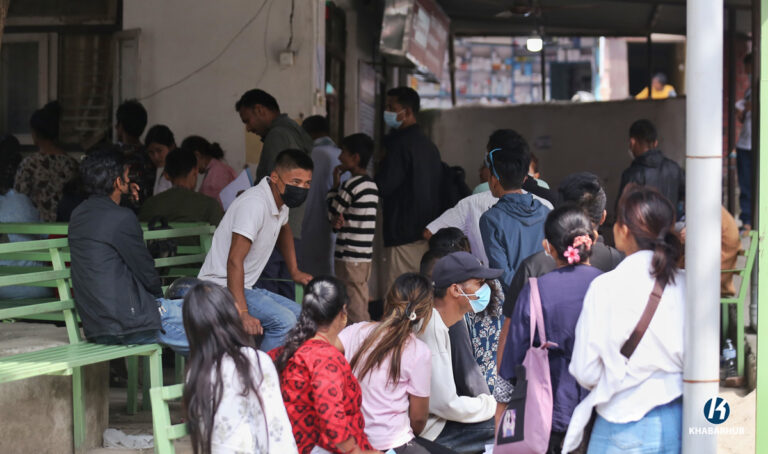KATHMANDU: The number of patients suffering from seasonal flu, colds, and viral infections has surged across Kathmandu Valley, with major hospitals like Bir Hospital, Civil Hospital, and Teaching Hospital witnessing an increasing influx of patients.
Dr Milan Khadka, a general physician at Bir Hospital, reported that roughly 30 percent of daily outpatients present with flu-like symptoms.
Speaking to Khabarhub, Dr Khadka explained that while seasonal flu typically resolves within a week, current cases are taking 10 to 12 days to subside.
Symptoms such as persistent dry cough, mild fever, body aches, and fatigue have been observed across all age groups, though children, the elderly, and those with chronic illnesses are particularly vulnerable.
“This rise in infections is less attributable to cold weather and more to increasing air pollution, a phenomenon linked to weather change,” he said.
Unlike previous years, the winter in Kathmandu Valley has been less severe, with milder temperatures recorded.
This has created conditions conducive to the spread of viral infections, which, Dr Khadka said, align with the global rise in respiratory illnesses exacerbated by worsening air quality.
Additionally, he highlighted the similarities between the current symptoms and those caused by the human metapneumovirus (HMPV), which has recently impacted children under 14 in China and India.
While there is no confirmation that the same virus has reached Nepal, Dr Khadka emphasized that the symptoms bear a resemblance.
“To mitigate the spread of infection, he advised adopting precautions similar to those taken during the Covid pandemic, including rest, proper hydration, nutritious diets, and the consistent use of masks in public spaces,” he said.
Many patients, he explained, seek hospital care only after self-medicating unsuccessfully, with diagnostic tests revealing no significant complications other than persistent symptoms.
At the Teaching Hospital, chest specialist Dr Pankaj Pant also reported a spike in cases of viral infections, particularly among individuals with pre-existing respiratory conditions like asthma and chronic obstructive pulmonary disease (COPD).
Patients often present with prolonged coughing, fever, chest congestion, throat pain, and fatigue.
Dr Pant noted that while some symptoms mirror those of HMPV, no severe cases or official diagnoses have been made in Nepal to date.
He urged the public to prioritize hygiene, including handwashing and mask usage, and to consume warm, fluid-rich diets to enhance immunity.
Similar trends have been observed at Civil Hospital and other private facilities, with rising numbers of patients seeking treatment for seasonal flu and respiratory issues.
Pharmacists, including Dipesh Dahal of Annapurna Neuro Hospital, have observed a sharp increase in demand for cough syrups and allergy medications. He attributed this spike to prolonged exposure to polluted air, worsened by the lack of rainfall.
Experts have also pointed to the role of poor indoor air circulation during winter months, as people tend to keep windows and doors closed to retain warmth.
This, they explained, reduces the flow of fresh air, allowing airborne pathogens to linger indoors. Combined with the already high levels of outdoor pollution, these conditions create an environment conducive to the spread of respiratory infections.
Doctors stressed the importance of preventive measures, such as wearing warm clothing, consuming vitamin-rich foods like fish, eggs, and citrus fruits, and ensuring adequate hydration to bolster the immune system.
They also warned against neglecting symptoms, as untreated cases of the flu could escalate into bronchitis or pneumonia, particularly in vulnerable populations.
Proper ventilation in living spaces and adherence to hygiene practices—such as covering the mouth and nose while coughing or sneezing and avoiding close contact with infected individuals—can significantly reduce the risk of transmission.
Experts also cautioned against activities like burning paper for warmth, which exacerbates air pollution and increases the likelihood of respiratory complications.
By adopting these measures, medical professionals believe the spread of seasonal flu and viral infections can be effectively contained, safeguarding public health during the winter months.









Comment